#carter g. woodson
Text
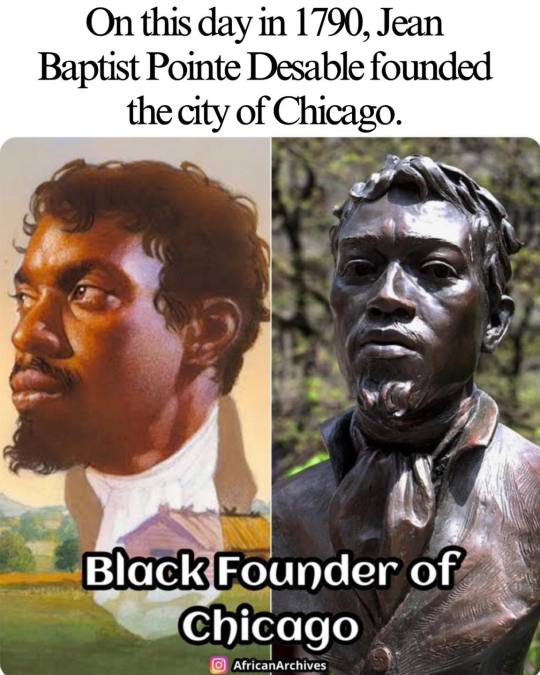
Jean-Baptiste Pointe DuSable was born in Saint-Domingue, Haiti (French colony) during the Haitian Revolution. At some point he settled in the part of North America that is now known as the city of Chicago and was described in historical documents as "a handsome negro"
He married a Native American woman, Kitiwaha, and they had two children. In 1779, during the American Revolutionary War, he was arrested by the British on suspicion of being an American Patriot sympathizer.
In the early 1780s he worked for the British lieutenant-governor of Michilimackinac on an estate at what is now the city of St. Clair, Michigan north of Detroit.
In the late 1700's, Jean-Baptiste was the first person to establish an extensive and prosperous trading settlement in what would become the city of Chicago. Historic documents confirm that his property was right at the mouth of the Chicago River.
Many people, however, believe that John Kinzie (a white trader) and his family were the first to settle in the area that is now known as Chicago, and it is true that the Kinzie family were Chicago's first "permanent" European settlers.
But the truth is that the Kinzie family purchased their property from a French trader who had purchased it from Jean-Baptiste.
He died in August 1818, and because he was a Black man, many people tried to white wash the story of Chicago's founding. But in 1912, after the Great Migration, a plaque commemorating Jean-Baptiste appeared in downtown Chicago on the site of his former home.
Later in 1913, a white historian named Dr. Milo Milton Quaife also recognized Jean-Baptiste as the founder of Chicago.
And as the years went by, more and more Black notables such as Carter G. Woodson and Langston Hughes began to include Jean-Baptiste in their writings as "the brownskin pioneer who founded the Windy City."
In 2009, a bronze bust of Jean-Baptiste was designed and placed in Pioneer Square in Chicago along the Magnificent Mile.
There is also a popular museum in Chicago named after him called the DuSable Museum of African American History.
x
#Jean-Baptiste Pointe DuSable#Haitian Revolution#Chicago history#founder of Chicago#black history#Native American wife#Kitiwaha#American Revolutionary War#British arrest#Michilimackinac#St. Clair Michigan#trading settlement#Chicago River#John Kinzie#European settlers#Great Migration#Carter G. Woodson#Langston Hughes#Windy City#bronze bust#Pioneer Square#Magnificent Mile#DuSable Museum#African American history
557 notes
·
View notes
Text
According to historians, this is the true reason Black History Month occurs. The shortest month of the year, February
Frederick Douglass
Many wonder why Black History Month falls in February, which is the shortest month of the year. Historians claim there is an easy solution: Black History Month, which started off as Negro History Week in 1926, is observed in February because it falls on the birthdays of Frederick Douglass and President Abraham Lincoln, two significant abolitionists.
Lincoln was born on…
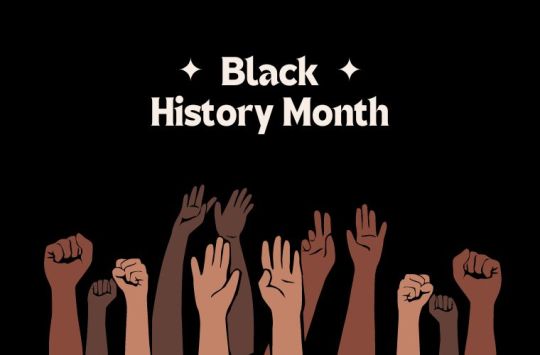
View On WordPress
#Abraham Lincoln#Black History Month#black student strike UW-Madison#carter G. Woodson#Demand Letter#February#Frederick Douglass#Latest#Valentines Day
4 notes
·
View notes
Text
Carter G. Woodson - Quote
We are closing out Black History Month with a quote from the Father of Black History Month, Dr. Carter G. Woodson. Click the link to learn more or listen via podcast.
#BlackMaill4u #BlackHistoryMonth #BlackHistoryQuote #CarterGWoodson #BlackHistoryFact
Welcome To Black Mail!
Where we bring you Black History, Special Delivery.
We close out Black History Month with a quote from the Father of Black History Month, Dr. Carter G. Woodson.
“We have a wonderful history behind us…and it is going to inspire us to greater achievements.”
-Dr. Carter G. Woodson
Dr. Woodson is so right! Our history is rich and wonderful, and it will propel present and…

View On WordPress
#African American History#Black History#Black History Fact#Black History Month#black history quotes#blackmail4u#Carter G. Woodson
14 notes
·
View notes
Text
EDITORIAL: What Black History Month Means to GBN in 2023 and Beyond
by Lori Lakin Hutcherson, GBN founder and Editor-in-Chief
Well, here we are, once again. Forty seven years after February was officially recognized by the U.S. government as Black History Month, and ninety seven years after Negro History Week was founded by Carter G. Woodson, “The Father of Black History.”
We are also, once again, deeply distressed by the murder of a young Black person (Tyre…
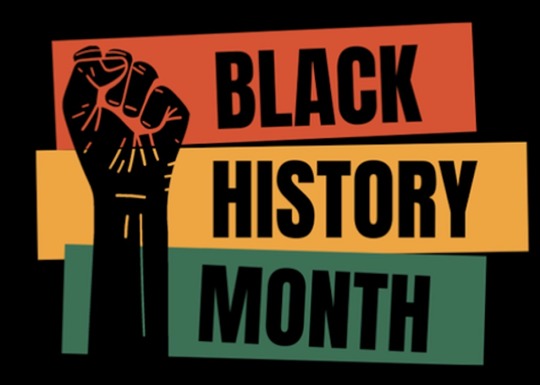
View On WordPress
#Benjamin Crump#Beyoncé#Black History Month#Carter G. Woodson#Dr. Martin Luther King#Frederick Douglass#Good Black News#Harriet Tubman#Jackie Robinson#Jr.#Negro History Week#Nikole Hannah-Jones#Rosa Parks#Sidney Poitier
14 notes
·
View notes
Photo

The Mis-education of the Negro
By Carter G. Woodson.
4 notes
·
View notes
Text
Quote:
How come they gave us the shortest month?
This question often comes from the Black side of the spectrum. Not stupid, just perhaps under-informed. The good news is, a little Black History is all one needs to understand the answer to that question:
National African-American History Month had its origins in 1915 when historian and author Dr. Carter G. Woodson founded the Association for the Study of Negro Life and History. This organization is now known as the Association for the Study of African American Life and History (“ASALH”). Through this organization Dr. Woodson initiated the first Negro History Week in February 1926. Dr. Woodson selected the week in February that included the birthdays of Abraham Lincoln and Frederick Douglass, two key figures in the history of African-Americans.
In 1975, President Ford issued a Message on the Observance of Black History Week urging all Americans to “recognize the important contribution made to our nation’s life and culture by black citizens.” In 1976 this commemoration of Black History in the United States was officially expanded by ASALH to Black History Month, also known as African American History Month, and President Ford issued the first Message on the Observance of Black History Month.- Library of Congress
See? No one “gave us” the shortest month. Black people did it. Black people took agency and created a time to celebrate Black History. Nobody handed it to us. No one made it up for us. Pro-tip: you see something celebrating Blackness, guarantee somebody black was probably behind it. The world ain’t been handing out free “Celebrate Your Blackness” points in a minute.
So to recap: A BLACK PERSON CHOSE FEBRUARY FOR BLACK HISTORY MONTH. And he had serious BLACK REASONS for doing so. If you disagree with Woodson’s reasons, that’s fine. We can certainly discuss. But now you have a Black History answer to your question about Black History Month. Go run tell, tweet and preach that. And read more books. Books are cool.
i highly recommend the entire article and this year's too i'm sure
#i did not know so i am sharing#u.s. history#P. Djèlí Clark#p. djeli clark#black history month#carter g. woodson#2022 edition#but i'm sure he's got one for 2023 now#phenderson djeli clark
2 notes
·
View notes
Text
I am grateful to Dr. Carter G. Woodson for creating Black History Week in 1926, which evolved into a month forty years later in 1976. Happy Black History Month, everybody!
#black america#Happy black history month#February 1st#black history month#Black history#Carter G. Woodson
0 notes
Text
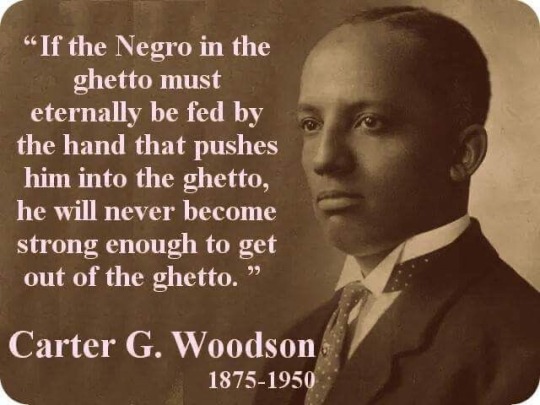
267 notes
·
View notes
Text
Black History Month
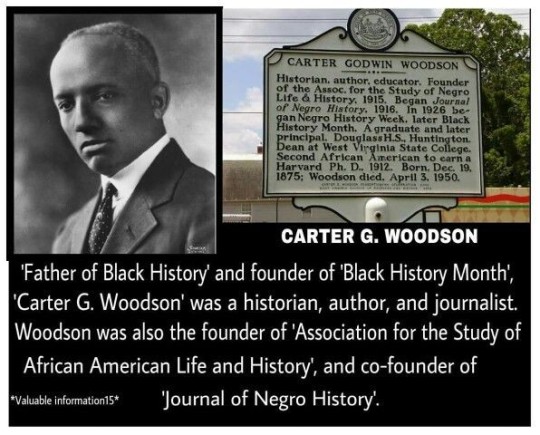
#black tumblr#black history#black literature#black excellence#black community#civil rights#black history is american history#blackexcellence365#carter g woodson#black history month#founder of black history#black archives#black culture
769 notes
·
View notes
Text
Omega Psi Phi Fraternity’s Instrumental In Launching First Negro History Week In 1924
In 1924, the Omega Psi Phi fraternity played a key role in launching the first “Negro History Week” that we now celebrate as Black History Month! Click the link to learn more or listen via podcast.
Welcome To Black Mail!
Where we bring you Black History, Special Delivery.
Passionate about spreading the knowledge of Black History, Carter G. Woodson launched Negro History Week, which we now celebrate as Black History Month. During the national meeting of Omega Psi Phi on December 27, 1920, Woodson gave a powerful speech encouraging his fraternity brothers to promote the study of Black…
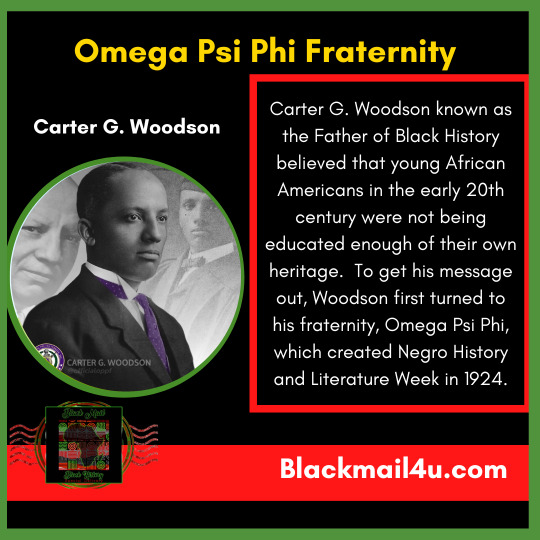
View On WordPress
#ASALH#Black History#Black History Fact#Black History Month#blackmail4u#Carter G. Woodson#Negro History Week#Omega Psi Phi Fraternity
11 notes
·
View notes
Text

Today In History
Dr. Carter Godwin Woodson, was born in New Canton, VA, on this date December 19, 1875. Woodson had worked as a sharecropper, miner and various other jobs during his childhood to help support his large family. Though he entered high school late, he made up for lost time, graduating in less than two years. After attending Berea College in Kentucky, Woodson worked in the Philippines as an education superintendent for the U.S. government. He earned his bachelor’s and master’s degrees at the University of Chicago before entering Harvard. In 1912, three years before founding the ASNLH (Association for the Study of Negro Life and History).
Dr. Carter G. Woodson became the second African American to receive a doctorate from Harvard University after W.E.B. Du Bois.
Woodson believed that young African Americans in the early 20th century were not being taught enough of their own heritage, and the achievements of their ancestors. In 1921 Woodson started his own publication the Associated Publishers Press and housed it at his row house on Ninth Street in Washington D.C. He then turned to his fraternity, Omega Psi Phi, who helped create Negro History and Literature Week in 1924.
In February 1926, Woodson sent out a press release announcing the first Negro History Week. As early as the 1940s, efforts began to expand the week of public celebration of African American heritage and achievements into a longer event. In 1976, on the 50th anniversary of the first Negro History Week, the Association officially made the shift to Black History Month.
Woodson dedicated his career to the field of African American history and lobbied extensively to establish Black History Month as a nationwide institution. He wrote many historical works, including the 1933 book The Mis-Education of the Negro.
We honor Dr. Carter G. Woodson legacy through CARTER™️ Magazine, extending his vision for making African American history available for everyone 365 days a year.
CARTER™️ Magazine
#carter magazine#carter#historyandhiphop365#wherehistoryandhiphopmeet#history#cartermagazine#today in history#staywoke#blackhistory#blackhistorymonth#dr carter g woodson#carter g woodson
89 notes
·
View notes
Text

130 notes
·
View notes
Text

When you control a man’s thinking you do not have to worry about his actions. You do not have to tell him not to stand here or go yonder. He will find his ‘proper place’ and will stay in it. You do not need to send him to the back door. He will go without being told. In fact, if there is no back door, he will cut one for his special benefit. His education makes it necessary.’
—Carter G. Woodson

9 notes
·
View notes
Text
17 notes
·
View notes